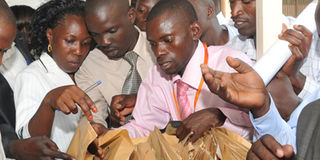160,000 students miss S.1 vacancies

Head teachers struggle to pick forms containing lists of entry selection forms for their respective schools at the East African University in Kampala yesterday. PHOTO BY FAISWAL KASIRYE
What you need to know:
Tight race. Of the 480,067 candidates who passed last year’s Primary Leaving Examination, government schools and partner institutions will only accommodate 316,980.
At least 163,087 students will miss Senior One admission to government-aided and privately-owned schools supported by the government, although they obtained the minimum requirements.
Mr Francis Agula, an assistant commissioner in the Education ministry, yesterday said out of the 480,067 candidates who passed last year’s Primary Leaving Examination, the government could only take 316,980. Of these, 20 per cent are from non-Universal Primary Education schools. He reported a 22 per cent intake increment from last year’s.
This means that 163,087 students will have to contend with placement in private institutions, which, according to Mr Agula, are slightly more expensive compared to those aided by the government.
“The cut-off points have been determined by the general performance and the number of candidates who applied in an individual school. In some schools, it has not changed while in others it has improved from last year,” Mr Agula said at the S1 selection exercise in Kampala yesterday.
About 156,900 students have been admitted in 922 Universal Secondary Education (USE) institutions, 131,100 have been placed in 863 USE private schools, 3,240 in 62 USE BTVET government and partnering institutions and 25,740 will join the 115 non-USE government-aided schools.
But some schools yesterday were still contemplating how they will handle the number of students the government had allocated them.
For instance, Teso College, Aloet, had 300 slots allocated to it out of the 1,807 pupils who applied.
The head teacher, Mr Silvester Ocaatum, however, said the school could only admit 250 students because of the limited facilities.
“Our cut-off points have been aggregate 9. We have even left out candidates with these marks. We have vacancies for 250 students not 300, which the government has given us. Our facilities, including classrooms and teachers are limited,” Mr Ocaatum told the Daily Monitor.
This was no different from Maryhill High School in Mbarara where only 200 students were admitted out of the 1,408 candidates who gave the school their first choice.
Competition raises cutoffs
This raised the competition for the candidates wishing to join forcing government to raise the cutoff points from seven to six.
Her school being under the USE programme, Nakifuma High School headmistress, Ms Hanifah Bukenya, wondered where to put her students who scored at least aggregate 28 after the government gave her a cut off of 25.
“We were given up to aggregate 25. But this is a USE school which accommodates up to 28. What do we do? Ours is the only USE school within my locality. These students will be coming to me challenging me. What will I say?” she asked.
But Mr Agula said the government policy still standards and as long as a student has the required points and the school can accommodate them, they should admit them.
Mr Robinson Nsambu-Lyazi, assistant private schools commissioner, urged the head teachers to guard against absenteeism, dropouts, child labour, early marriages, sexual harassment and strikes.
Although he admitted that there were few teachers with some schools sharing especially in the science discipline, Mr Nsambu-Lyazi insisted that school administrators should ensure that learners cover the syllabi which gives them more options for better performance.
“Past experience shows that a number of schools are not completing the syllabi. This must change. If the curriculum is not completed, students cannot perform well,” Mr Nsambu-Lyazi said.
He also said the ministry was advocating for behaviourial change in the fight against HIV/Aids and asked the school heads to spread the gospel
“Realise that HIV/Aids is with us. It continues to be a challenge to the country. As a ministry, we advocate for behaviourial change other than the other interventions. It is only with life that you can perform in school,” he told about 2000 school administrators.
Reported By Patience Ahimbisibwe, Al-Mahdi Ssenkabirwa, Abdu Kiyaga, Shabibah Nakirigya & Angella Nalwanga




